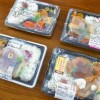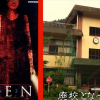Local media makes no mention of father-of-three’s sacrifice, triggers angry, embarrassed reactions from Japanese nationals.
Early in the morning of December 1, a six-car accident occurred on the Okinawa Expressway in the Chibana neighborhood of Okinawa City. Both Japanese nationals and U.S. military personnel were involved in the accident, one of whom was 44-year-old Marine master sergeant Hector Trujillo.
The Okinawa Times, one of two prominent local newspapers, reported on the incident with:
“According to police, an ultra-compact kei car struck a passenger car, causing it to turn over. Another kei car reacted to the accident and came to a stop, and was rear-ended by a car driven by a 44-year-old U.S. Marine master sergeant. The master sergeant parked his car on the side of the road, exited the vehicle, and while in the road he was struck by a car driven by a 28-year-old Marine staff sergeant [and was rushed to Chubu Hospital, unconscious and in critical condition]. The driver of the car that overturned, a man in his 50s, sustained light injuries.”
The other major local media outlet, Ryukyu Shimpo, had a similar report, though its recap begins with Trujillo rear-ending the car before later describing the initial between-Japanese-drivers collision. Like the Okinawa Times, Ryukyu Shimpo’s account also simply states that “the master sergeant was struck by the staff sergeant’s car after exiting his vehicle” (neither paper mentions the driver of the car Trujillo rear-ended being injured).
https://twitter.com/GoFundAHero1/status/938860752022245376Absent from both reports is any mention of why Trujillo, a married man and father of three, was still in the road after getting out of his own car. The reason is that he noticed that the above-mentioned 50-something driver of the overturned car was still trapped inside, and rather than get himself to safety as quickly as possible, Trujillo made the choice to get the driver out of danger first.
But while the overturned car’s driver made it out of the incident with only minor injuries, Trujillo fared much worse. When the car hit Trujillo, it fractured his skull and damaged his neck and spine. He has since been transferred to Naval Medical Center in Balboa for continuing treatment (a donation website to help his family cover travel expenses to be with him has been set up here).
The lack of Okinawan media coverage of Trujillo’s unhesitant courage to help a stranger is perhaps not entirely shocking, given the often strained relationship between Okinawan political and media organizations and the American military, which has maintained multiple facilities on the islands since the end of World War II. However, regardless of the sociopolitical debate about the U.S. military presence, Keiichi Takagi, head of Sankei News’ Naha (Okinawa) Bureau, finds the lack of respect shown for Trujillo’s sacrifice deplorable, saying:
“Cars regularly drive along the Okinawa Expressway at speeds of 100 kilometers (62 miles) per hour. Getting out into the road is incredibly dangerous, but Trujillo sacrificed his own safety to save the life of a Japanese citizen. It is thanks to Trujillo’s courageous actions that the driver of the car was able to escape with only light injuries.
…
Ignoring what he did is conduct unbecoming media and news organizations, and as a citizen of Japan, I find it shameful. I am praying for Trujillo’s swift recovery.”
As news of what Trujillo did has begun making its way around the Internet, Japanese Twitter users’ comments have included:
“Why aren’t the paper talking more about what he did? I want to express my respect for Trujillo’s courage, and am earnestly praying for his full recovery.”
“I have the deepest appreciation for his heroic actions, and am embarrassed by, and want to apologize for, the pitiful media organizations of my country.”
“Everyone in Okinawa, no, in all Japan, should hear about what he did.”
“There are some Americans who are atrocious, but there are also Americans like Trujillo. You can’t lump everyone together, you have to look at people on an individual basis.”
“Thank you for your amazing heroism.”
This isn’t the first time in recent memory that Japan-stationed U.S. Marines have come to the aid of host country nationals, as last summer a group of Marines came across a woman who’d collapsed on the slope of Mt. Fuji and carried her to safety.
As heated as political debates can get, it can sometimes be hard to remember that government entities, militaries included, are still made up of human beings. There’s no indication as to how the man Trujillo pulled out of his car feels about the issue of U.S. bases on Okinawa, but we imagine that on the morning of the accident, he was glad that Trujillo was close by.
Sources: Livedoor News/Samnkei News via Jin, Okinawa Times, Ryukyu Shimpo, Go Fund a Hero, NBC San Diego
Featured image: Twitter/@GoFundAHero1

 Americans show support to Okinawa after murder, locals ask “Why doesn’t Japanese news show this?”
Americans show support to Okinawa after murder, locals ask “Why doesn’t Japanese news show this?” Japan-stationed U.S. fighter plane crashes in Okinawa
Japan-stationed U.S. fighter plane crashes in Okinawa Drive recorder catches the moment a car flies into the front of an oncoming bus
Drive recorder catches the moment a car flies into the front of an oncoming bus Autopsy results, cause of death released for Yu-Gi-Oh! manga creator Kazuki Takahashi
Autopsy results, cause of death released for Yu-Gi-Oh! manga creator Kazuki Takahashi Hayao Miyazaki speaks out against relocation of Okinawa U.S. base, criticizes Prime Minister Abe
Hayao Miyazaki speaks out against relocation of Okinawa U.S. base, criticizes Prime Minister Abe Foreigner’s request for help in Tokyo makes us sad for the state of society
Foreigner’s request for help in Tokyo makes us sad for the state of society Japan’s summertime towelket pillowcases are even better with the addition of Ghibli stars【Photos】
Japan’s summertime towelket pillowcases are even better with the addition of Ghibli stars【Photos】 Ghibli Park now selling “Grilled Frogs” from food cart in Valley of Witches
Ghibli Park now selling “Grilled Frogs” from food cart in Valley of Witches Japanese city loses residents’ personal data, which was on paper being transported on a windy day
Japanese city loses residents’ personal data, which was on paper being transported on a windy day Suntory x Super Mario collaboration creates a clever way to transform into Mario【Videos】
Suntory x Super Mario collaboration creates a clever way to transform into Mario【Videos】 Seaside scenery, history, and so many desserts on Yokohama’s Akai Kutsu【Japan Loop Buses】
Seaside scenery, history, and so many desserts on Yokohama’s Akai Kutsu【Japan Loop Buses】 We recreate the delicious-looking meatball stew from Laputa: Castle in the Sky【SoraKitchen】
We recreate the delicious-looking meatball stew from Laputa: Castle in the Sky【SoraKitchen】 We taste makunouchi bento at four Japanese convenience store chains【Taste comparison】
We taste makunouchi bento at four Japanese convenience store chains【Taste comparison】 Japan’s massive matcha parfait weighs 6 kilos, contains hidden surprises for anyone who eats it
Japan’s massive matcha parfait weighs 6 kilos, contains hidden surprises for anyone who eats it Camera crew visits the abandoned town that inspired Japanese survival horror game “Siren”【Video】
Camera crew visits the abandoned town that inspired Japanese survival horror game “Siren”【Video】 McDonald’s new Happy Meals offer up cute and practical Sanrio lifestyle goods
McDonald’s new Happy Meals offer up cute and practical Sanrio lifestyle goods Japanese ramen restaurants under pressure from new yen banknotes
Japanese ramen restaurants under pressure from new yen banknotes French Fries Bread in Tokyo’s Shibuya becomes a hit on social media
French Fries Bread in Tokyo’s Shibuya becomes a hit on social media Studio Ghibli releases new action figures featuring Nausicaä of the Valley of the Wind characters
Studio Ghibli releases new action figures featuring Nausicaä of the Valley of the Wind characters Red light district sushi restaurant in Tokyo shows us just how wrong we were about it
Red light district sushi restaurant in Tokyo shows us just how wrong we were about it New private rooms on Tokaido Shinkansen change the way we travel from Tokyo to Kyoto
New private rooms on Tokaido Shinkansen change the way we travel from Tokyo to Kyoto Tokyo Tsukiji fish market site to be redeveloped with 50,000-seat stadium, hotel, shopping center
Tokyo Tsukiji fish market site to be redeveloped with 50,000-seat stadium, hotel, shopping center Beautiful Ghibli sealing wax kits let you create accessories and elegant letter decorations【Pics】
Beautiful Ghibli sealing wax kits let you create accessories and elegant letter decorations【Pics】 Studio Ghibli releases Kiki’s Delivery Service chocolate cake pouches in Japan
Studio Ghibli releases Kiki’s Delivery Service chocolate cake pouches in Japan New definition of “Japanese whiskey” goes into effect to prevent fakes from fooling overseas buyers
New definition of “Japanese whiskey” goes into effect to prevent fakes from fooling overseas buyers Our Japanese reporter visits Costco in the U.S., finds super American and very Japanese things
Our Japanese reporter visits Costco in the U.S., finds super American and very Japanese things All-you-can-drink Starbucks and amazing views part of Tokyo’s new 170 meter-high sky lounge
All-you-can-drink Starbucks and amazing views part of Tokyo’s new 170 meter-high sky lounge More foreign tourists than ever before in history visited Japan last month
More foreign tourists than ever before in history visited Japan last month New Pokémon cakes let you eat your way through Pikachu and all the Eevee evolutions
New Pokémon cakes let you eat your way through Pikachu and all the Eevee evolutions Disney princesses get official manga makeovers for Manga Princess Cafe opening in Tokyo
Disney princesses get official manga makeovers for Manga Princess Cafe opening in Tokyo Sales of Japan’s most convenient train ticket/shopping payment cards suspended indefinitely
Sales of Japan’s most convenient train ticket/shopping payment cards suspended indefinitely Sold-out Studio Ghibli desktop humidifiers are back so Totoro can help you through the dry season
Sold-out Studio Ghibli desktop humidifiers are back so Totoro can help you through the dry season Japanese government to make first change to romanization spelling rules since the 1950s
Japanese government to make first change to romanization spelling rules since the 1950s Ghibli founders Toshio Suzuki and Hayao Miyazaki contribute to Japanese whisky Totoro label design
Ghibli founders Toshio Suzuki and Hayao Miyazaki contribute to Japanese whisky Totoro label design Doraemon found buried at sea as scene from 1993 anime becomes real life【Photos】
Doraemon found buried at sea as scene from 1993 anime becomes real life【Photos】 Tokyo’s most famous Starbucks is closed
Tokyo’s most famous Starbucks is closed One Piece characters’ nationalities revealed, but fans have mixed opinions
One Piece characters’ nationalities revealed, but fans have mixed opinions We asked a Uniqlo employee what four things we should buy and their suggestions didn’t disappoint
We asked a Uniqlo employee what four things we should buy and their suggestions didn’t disappoint Princesses, fruits, and blacksmiths: Study reveals the 30 most unusual family names in Japan
Princesses, fruits, and blacksmiths: Study reveals the 30 most unusual family names in Japan From bad to worse: Japanese driver hits car, sends it flying into Ferrari/Lamborghini showroom
From bad to worse: Japanese driver hits car, sends it flying into Ferrari/Lamborghini showroom Driver who killed cyclist in crosswalk accident found not guilty, causes controversy in Japan
Driver who killed cyclist in crosswalk accident found not guilty, causes controversy in Japan Japanese police ask drunk people to please stop sleeping in the middle of the street
Japanese police ask drunk people to please stop sleeping in the middle of the street University of Tokyo lecturer suggests giving cars big cartoon eyes will make them safer
University of Tokyo lecturer suggests giving cars big cartoon eyes will make them safer Crazy clothes, car accidents, and bungie jumping: The 2016 “Coming of Age Day” round-up
Crazy clothes, car accidents, and bungie jumping: The 2016 “Coming of Age Day” round-up Kumamoto Police sergeant reprimanded for making officers eat spicy instant noodles
Kumamoto Police sergeant reprimanded for making officers eat spicy instant noodles Pokémon GO-playing driver’s two year prison sentence for manslaughter upheld. Was it enough?
Pokémon GO-playing driver’s two year prison sentence for manslaughter upheld. Was it enough? 69-year-old Tokyo man arrested for driving without a license for over 50 years
69-year-old Tokyo man arrested for driving without a license for over 50 years Driver struck by another vehicle in the wrong lane, still ordered to pay 40 million yen
Driver struck by another vehicle in the wrong lane, still ordered to pay 40 million yen Tiny Suzuki scores one for the little guys by pulling huge big rig out of the snow 【Video】
Tiny Suzuki scores one for the little guys by pulling huge big rig out of the snow 【Video】 Shoplifter drags drug store clerk 130 meters by car in Hyogo Prefecture
Shoplifter drags drug store clerk 130 meters by car in Hyogo Prefecture Swarms of insects cause chaos on bridge in Japan
Swarms of insects cause chaos on bridge in Japan Man arrested in Kyoto after failing to return rental car over a year past deadline
Man arrested in Kyoto after failing to return rental car over a year past deadline “Daaangerrrr!” Fukuoka town experiments with new road markings
“Daaangerrrr!” Fukuoka town experiments with new road markings Traffic accident scammer caught on CCTV in China, ends up having to pay fine himself 【Video】
Traffic accident scammer caught on CCTV in China, ends up having to pay fine himself 【Video】
Leave a Reply